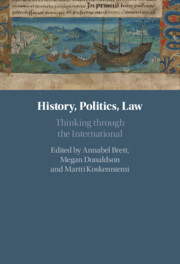Book contents
- History, Politics, Law
- History, Politics, Law
- Copyright page
- Contents
- Acknowledgments
- Notes on Contributors
- Introduction History, Politics, Law
- Part I Methods, Approaches and Encounters
- 1 Between History, Politics and Law
- 2 The Past according to International Law
- 3 The Context for Context: International Legal History in Struggle
- 4 After Method: International Law and the Problems of History
- Part II Thinking through the International
- Index
2 - The Past according to International Law
A Practice of History and Histories of a Practice
from Part I - Methods, Approaches and Encounters
Published online by Cambridge University Press: 28 September 2021
- History, Politics, Law
- History, Politics, Law
- Copyright page
- Contents
- Acknowledgments
- Notes on Contributors
- Introduction History, Politics, Law
- Part I Methods, Approaches and Encounters
- 1 Between History, Politics and Law
- 2 The Past according to International Law
- 3 The Context for Context: International Legal History in Struggle
- 4 After Method: International Law and the Problems of History
- Part II Thinking through the International
- Index
Summary
Law is an intensely historical practice. From Bodin to Savigny, from the veneration they have felt for the ‘ancient constitution’ at home to the energy with which they have embraced modernity and progress, lawyers have enlisted history to assist the power of what they have wanted to say. Law is, it sometimes feels (and is often said), precisely about the authority of the past over the present. This is true of international law as well. Working as a diplomat-lawyer, it often seemed to me that the professional service I was expected to render was to operate as the foreign ministry’s historical archive. Political decision-makers tended to feel that the situations they were faced with were new and unprecedented. The lawyers were to assist them by showing what ‘we’ did in analogous cases five, fifteen or fifty years ago. The decision then frequently came about as ‘Well, let’s do now what we did then’. There is a definite conservative wisdom in such practice. People have expectations about behaviour, based on the past, and it is often a good idea not to fail them. Indeed, much of (international) legal practice is about trying to figure out what those expectations are. In preparing a case in the International Court of Justice, counsel of the parties spend an inordinate amount of time in the archives so as to find out what agreements, understandings or patterns of behaviour may have emerged. Past facts and texts are collected into some narrative that pretends to authority, at least better authority than the story of the adversary.
- Type
- Chapter
- Information
- History, Politics, LawThinking through the International, pp. 49 - 68Publisher: Cambridge University PressPrint publication year: 2021



